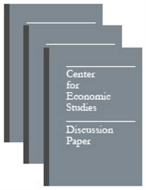Learning By Doing And Competition In The Early Rayon Industry
Learning By Doing And Competition In The Early Rayon Industry
Working Paper Number: CES-93-04
Abstract
In this paper, I derive a structural econometric model of learning by doing from a dynamic oligopoly game. Unlike previous empirical models, this model is capable of testing hypotheses concerning both the technological nature and behavioral implications of learning. I estimate the model with firm level data from the early U.S. rayon industry. The empirical results show that there were considerable differences across firms in both proprietary and spillover learning. The results also indicate that two of the three firms took their rival's reactions into account when choosing their strategies.
Page Last Revised - October 8, 2021




